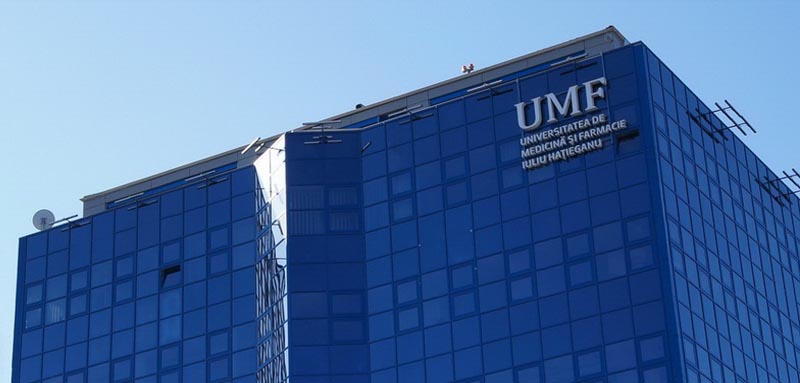
INTRODUCTION
Cluj-Napoca University of Medicine and Pharmacy is the continuation of the Faculty of Medicine and Pharmacy, Cluj Napoca Medical University also called University of Medicine and Pharmacy, Cluj-Napoca is the continuation of the Medicine and Pharmacy Faculty, founded in 1919 at Cluj, as part of Cluj University. With over 850 teachers and researchers, The medical university of Cluj Napoca has undergraduate programs long cycle (5 to 6 years), Short-cycle (3 to 4 years) and several post graduate programs organized into 5 faculties.
University of Medicine Cluj trough faculties of medicine, Pharmacy, Dentistry and Bioengineering organise several undergraduate (short and long term programs) and postgraduate (Master, PhD/Doctorate, Residency and other courses) programs. The Faculty of Medicine has the mission to promote academic education and performance in training students who are competitive for the European space, and who can integrate on the labor market from health systems.
The six years of study provided by the Faculty of Medicine come to a close with the license examination, after which young physicians can continue their training either by signing up for residency to a laboratory or clinical specialty, or by heading for scientific research through MA or PhD programs.
Faculties
Long program University Degree
Faculty of General Medicine (6 years - in Romanian, English and French), Faculty of Dental Medicine ( 6 years - in Romanian, English and French), Faculty of Pharmacy (5 years - in Romanian and French).
The Faculty of Medicine is the core of the University, around which all the other faculties of the University of Medicine and Pharmacy Cluj-Napoca have been established. It is today one of the top three academic institutions in Romania. The Medical Faculty hosts about 5200 students, on three separate medical programmes, in Romanian, French and English. The preponderant nationalities of the students on the English-taught programme are German, Swedish and Israeli.
From its foundation, the main objective of the Faculty of Medicine has been to combine innovation in bio-medical sciences and respect for humanity and the ill human being, with cutting edge teaching resources. The university has an excellent pedagogical infrastructure: the laboratories for practical activities, the seminar rooms and the lecture halls for 1st, 2nd and 3rd year students are trained are in the Regional Emergency Hospital and at the Medical Teaching Centre in Pasteur Street. For the clinical education, the university has an agreement with all hospitals and medical institutes in Cluj, in that student in years 3-6 will learn directly from live cases. The programme requires students to speak Romanian from years 4.
Faculty Of Medicine Of Cluj - Napoca Medical University
Degree: Medical Doctor (M.D.)
After the dramatic political, economical, and social changes that took place in Romanian in 1989, the university has undergone significant changes in its image and organization.
The spiritual life has become more dynamic, the logistic support a lot more substantial, and the methods have been improved and modernized. Each member of the teaching staff has benefited by participation in international conventions, trainings in new techniques, in a Western European country or the United States.
The education spaces have been modernized and several others have been built, so the number of students has grown from 7,000 in the year 2000, to 7,500 in 2004, and over 8,000 in 2006. In a large degree, owed to the great raise in the number of admissions of foreign students, the Faculty of Medicine and Pharmacy, of the University of Cluj has become an international institution, with a significant increase in the number of students registering in a post-graduate program.
The University of Cluj is known for the reputation that its foreign students have created as having the most open, friendly trained and multilingual professors.
Students of the Faculty of Medicine of the University of Cluj have the opportunity to study under the most modern conditions, as well as to participate at courses that are held in well-equipped lecture rooms.
The rector of "Cluj-Napoca" is Professor Constantin Ciuce, MD, PhD.
Faculty Of Deantistry Of Cluj - Napoca Medical University
Degree: Dentist (D.D.)The priorities of the Faculty place considerable emphasis on the development of multidisciplinary skills: observation, practicals, clinical, communication, computer, team work and management skills New study disciplines have been introduced, such as: occlusology, implantology, oral pathology and dental community medicine, in accordance with international higher education criteria. At present, 1604 students attend the courses of this Faculty, working under the supervision of 108 academics from 14 chairs.
Departments
- Oral, Craniomaxillary and Cervicofacial Surgery
- Conservative Odontology
- Restorative Odontology
- Pediatric Dental Medicine
Faculty Of Farmacy Of Cluj - Napoca Medical University
Degree: Pharmacist
The Faculty of Pharmacy has a complex structure including teaching staff and laboratories for all fundamental and specialty study disciplines. After 1989, new targets were initiated: the computerization of the education process, restructuring of the curricula according to contemporary European standards by adopting the transferable credit system as a basis for international mobility grants and prizes for students. 1257 students are enrolled, studying under the supervision of 48 academics from 21 chairs.
Departments
- Fundamental Sciences with Pharmaceutical Direction
- Biology and Natural Products
- Medicine Action and Analysis
- Medicine Preparation and Legislation
Conferences
Medicalis Medicalis is the annual conference for medical students and young doctors organised by O.S.M. and the Faculty of Medicine of the University of Cluj. Medicalis, which attracts over 800 national and international participants each year, focuses in medical sciences of all fields. The conference - which includes five sections for oral presentations, a section for poster presentations, workshops and lectures by experienced speakers, as well as a pleasant social program - has been one of the most popular conferences for medical students and young doctors in Romania.
Research Scientific research represents one of the missions assumed through "Cluj-Napoca".
Research activities are run in all disciplines and departments of the university, and financial support is ensured by grants and research contracts. The extraordinary effort of teaching staff collectives and the institutional frame has been remarkably improved after the creation of the Department for Research and Development.
"Cluj-Napoca" has two excellence centers and seven research centers in the university.
Library
"Valeriu Bologa", the library of "Iuliu Hatiegan" which was established in 1949, is a member of the E.A.H.I.L., has over 300,000 books and journals in Romanian, English and French and over 6,000 subscribed members. The director of the library is Ioana Robu. Student Living Cost In Romania
Medicalis
Student living cost in Romania is not so expensive compared to other European countries, but the monthly amount can vary depending on the lifestyle of each international student. Nevertheless, with 300 to 500 EURO/ month, an international student can live very comfortably and enjoy affordable University education in Romania.




